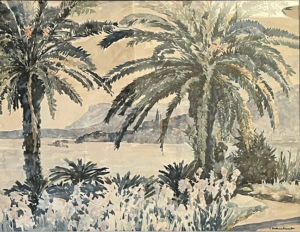On reading Research must do no harm: new guidance addresses all studies relating to people. Nature, 2022.
The Rock of Monaco seen from the botanical garden at Menton by Robert Mauchant (1893-1970)
This is a very interesting editorial from Nature. In their own words ‘the guidance encourages authors, reviewers and editors to respect the dignity and rights of groups and people.’ It goes beyond the rights of people enrolled in scientific studies of all sorts by addressing the impact the findings may have on others.
On reading is focused on Gain of Function (GOF) on viruses and is always looking for parallel discussions that may help contribute to the debate. The editorial starts by describing an experiment that could not be approved today.
A couple of points are worth pulling out:
- ‘first, that the research community should consider potentially harmful implications of research as applied to groups;’
- ‘second, that the community should strive to minimize the potential for misuse and the risks of harm to these groups;’
It all makes sense.
This is immediately followed by ‘The guidance applies principles that are already cornerstones of research ethics: beneficience (a moral obligation to act for the benefit of others) and non-maleficience (a duty to avoid harm).’ On reading was on a cloud but crashed after realizing the editorial wasn’t about GOF research.
The roller-coaster read continued; ‘if publication risks people being harmed, authors and editors need to consider those risks against any benefits that could arise from publication.’ Hmm, authors and editors.
Yet it wasn’t over. Such common sense was only to be coiffed by the omega of the last paragraph: ‘Academic freedom is a fundamental and non-negotiable premise of scholarship. However, it is not without limits. All academic research requires ethical considerations to maximize benefits and reduce or eliminate harms.’
On reading’s heart fluttered. That the Nature editor wrote ‘Academic freedom… is not without limits;’ was almost too much. He was swept with nostalgia; it conjured up a long conversation with the French philosopher Voltaire back in the hot summer of 1772.
On reading was all fired up to write to Nature asking them if they would care to write an comparable editorial on GOF virology.
Whatever your take on GOF research, do overlook the prose. This editorial is well worth reading in its own right.
An aside
This is only the second time On reading has gone through a time warp ending up conversing with Voltaire. The other occasion was over 20 years ago on an equally important matter.

